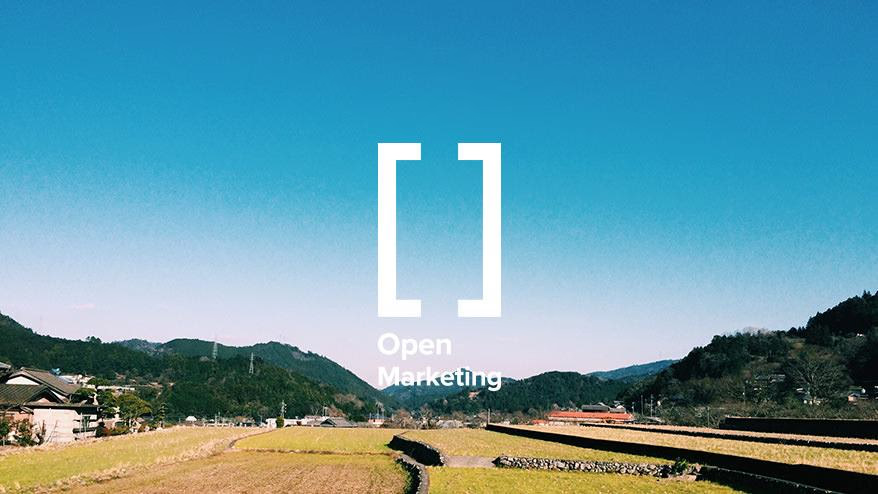みなさん、こんにちは。モノサス代表の林です。
今年の2月からはじめたこの連載も11回目、
気がつけば来月で連載開始から1年が経過しようとしています。
今年最後のOpen Marketingである今回は、
これまでのこの連載の流れを整理するとともに、
なぜOpen Marketingという考えについてみなさんにお伝えしているのかを
昨今の時流なども交えながらお話したいと思います。
マーケティングという概念が生まれた背景
まずみなさんと共有しておきたいのは、この100年は
「売る」「買う」という概念がこれまでの人類史上最も急速に
変化した時代であるということです。
「売る」「買う」という概念の歴史は非常に古く、
それこそ古代メソポタミアでも銀を加工して秤量銀貨を用いていたという
記載があるように、貨幣を用いた商取引の歴史だけでも
4000年以上の歴史があります。
さらに物々交換の時代まで遡ると、その記録をたどることは難しいほどです。
一方で、第7回でも触れましたが、マーケティングという概念が登場したのは、
1900年代初頭のアメリカにおいてです。
工業化によって大量に生産された製品を
広大な国土に効率よく販売していこうとする過程で創出され、
均一で均質なものを大量生産(もしくは販売)する企業と、
それらを選びとって大量消費する消費者という関係性を整理するプロセスで
発展してきた概念です。
マーケティングという言葉が生まれた背景には、
こういった商取引の仕組みの変化が大きく影響していると私は考えています。
マーケティングという概念が生まれる以前は、
いわゆる少量生産・少量消費の世界でした。
自分が採取したもの、生産したもの、加工したものを、
近所の誰かに売る。
自分自身も近所の誰かが採取、生産、加工したものを買う。
ごく稀にシルクロードのような交易ルートに乗る高価な
工芸品も登場しますが、ほとんどの生産活動と消費活動は
顔の見える範囲で営まれてきました。
1900年代初頭にアメリカで活発になった大量生産システムは、
製造コストの圧縮とともに、価格の低下をもたらしました。
価格競争力をもった商品は工場から、はるかかなたに出荷され、
知らない街で知らない人に買われていくことになります。
大量生産・大量消費の時代への変化が起こったのです。
この中で生み出されたもうひとつの概念が消費者です。
消費者という概念は、大量生産・大量消費の世界へと
変化していく過程で、だんだんと売り手、買い手双方の顔が
見えなくなるなか、1930年代ごろに形成されました。
マーケティングとは、
大量生産した製品を、アノニマスな消費者という存在に対して、
競合他社よりも優先して消費してもらうための手段として発展してきた
とも言い換えることができるのです。
数千年、数万年にわたって売り手と買い手、生産者と購買者は、
お互いに顔が見えていることが前提だったものが、わずか100年ほどで、
がらりと変わってしまったのです。
マーケティングはつねに情報の非対称性を利用してきた
また、近代のマーケティングが生み出したもうひとつの特徴があります。
情報の非対称性の拡大です。
つまりは、売り手と買い手の間で保有する情報量の格差が大きくなったことです。
もちろん近代以前にも情報の非対称性は存在しましたが、
顔の見える範囲での生産、消費活動におけるそれと、
大量生産、大量消費時代におけるそれとは、まったく異なる次元の差です。
製造プロセスの高度化、複雑化も情報の非対称性に拍車をかけました。
化学調味料の誕生や、食品加工技術の進化、合成着色料、香味料、
合成洗剤、石油化学の発展によるプラスチック類の誕生等々、
専門的な知識がなければ理解できないものが多くなりました。
消費者と名づけられた人びとは、価格が安く、
性能もよいそれらの新製品に飛びつきました。
一方でいくつかの問題も起きます。
過大に誇張された宣伝文句によって、
期待した品質ではないものを買わされたり、
知らない間に身体に害をおよぼすものを利用してしまい、
健康被害がでたりといったことです。
そこで企業側は新たに消費者たちにきちんと自社の製品や
自社のメッセージを信用してもらうための方法を探し始めます。
このプロセスで生み出されたのがブランディングの概念です。
企業はブランディングという手法によって、
よそ行きの公式な人格を身につけてゆくのです。
インターネットがもたらした買い手の復権
そこに登場したのがインターネットです。
世界中のどこにいてもあらゆる情報にアクセスできるようになり、
当初、そしていまも、企業はインターネットを活用した消費者への情報発信に
取り組むようになります。
しかし、ここで予期せぬ事態が起こります。
企業はこれまでと変わらずインターネット上で
自社のブランディングを高めるためのコンテンツ発信や、
DMやチラシによる通信販売をECサイトなどで代用していました。
消費者への情報リーチ単価が下がり、企業にとっては
新たなメディアが誕生しました。
ところがそこに登場したのがソーシャルメディアです。
10年ちょっと前に誕生したこの新たな動きは、世界中に広がり、
またたく間に消費者が発信する情報量が、企業が発信する情報量を
上回りました。
企業が発信する情報は、消費者によって
世界中のいたるところで評価にさらされ、
そして共有されていきました。
企業が何十年もかけて、注意深く身にまとってきた
よそ行きの公式な人格はあっという間に剥がされ、
隠してきた内面が日の目に晒されることになってしまいました。
大量消費・大量生産の時代が生み出した情報の非対称性に対して、
100年あまりかけて消費者に積もりに積もった不満が、
堰が切れたようにインターネット上に溢れ出したのです。
消費者が発信する情報は、その情報自体の質や真偽はともかく、
大きなうねりとなって情報の非対称性の格差を埋め、
企業と消費者の力関係そのものを変えてしまいました。
これからのマーケティング
何十年もかけて身につけてきたよそ行きの人格を剥がされてしまった企業は、
これからどうすればよいのでしょうか。
いまさら情報量を増やしてみたところで、すでに消費者との情報の非対称性は
埋まってしまっています。
さらにブランディングを強化すべくクリエイティブを作り込んでみても、
企業の内心は見透かされてしまっています。
企業側が編集した都合のよい情報は、あっという間にインターネットの力によって
評価、検証、共有されてしまうのです。
そんな世の中において、
これからの企業に求められることは、
正直であることではないでしょうか。
言葉や作り込まれたクリエイティブによって
自社のことを表現するのではなく、
「何を考えているか」「何をしているのか」
のたったふたつのことによって自分たちのありかたを
体現していくしかないのではないかと思います。
この「何を考えているか」「何をしているか」は
とりもなおさず、人が他人の人格を判断する時に観察しているものです。
近代の技術革新がもたらした、大量生産によるコストダウンと
マーケティング手法の確立によって、顔の見えない取引へと移行した
買い手と売り手の関係性は、インターネットの登場によって
距離が埋められ、擬似的ではありながらも、顔の見える取引へと
回帰しつつあるのではないでしょうか。
結局人びとが求めていたのは、数千年、数万年にわたって
身体にすりこまれてきた、顔の見える取引なのです。
その結果起こるのは、
インターネットでつながった世界中からの評価、検証に耐えられる
超グローバルブランドと、
実際に顔が見える、もしくはそれに近い範囲でコミュニティを形成しながら
発展していくローカルビジネスへの二極化だと考えています。
Open Marketingとは、こうした時代に企業がなにをもって
自社のあり方を伝えていくのかということを、
みなさんとともに考えていく活動にしていきたいと思っています。
ここであらためて、この連載の最初にみなさんにお伝えした
Open Marketingが大切にしている考えかたを再掲したいと思います。
これまでのように、自分たちの「よさ」を
相手におしつけるかのように主張するのではなく、
自分たちの会社のあり方、考え方、行動を
正直に伝えるという「ひらく」行為によって
ゆっくりと感じとってもらう。顧客を集めるのではなく、集う。
売るのではなく、価値を交換する。
つなぎとめるのではなく、つながる。
今回はここまでにしたいと思います。
最後までお読みいただき、ありがとうございました。
みなさまの新しい一年が幸せに満ちていますように。

